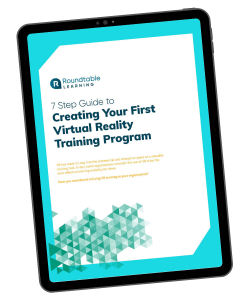Train the Trainer (TTT) is an important step that helps facilitators build the confidence to lead an instructor-led training (ILT) session. Think of TTT as a dress rehearsal.
Throughout a Train the Trainer session, facilitators complete the following:
- Check their understanding of the material and how it should be facilitated
- Ask questions about their facilitator guide
The better the Train the Trainer session, the more successful a facilitator will be because it ensures they are prepared to successfully deliver the material.
Ready to learn more about Train the Trainer? Let’s dive into what Train the Trainer is, why Train the Trainer is important, and the 5 traits of an effective facilitator.
What Is Train The Trainer?
Train the Trainer (TTT) is an important step that helps facilitators build the confidence to lead an instructor-led training (ILT) session.
Throughout a Train the Trainer session, facilitators complete the following:
- Check their understanding of the material and how it should be facilitated
- Ask questions about their facilitator guide
Train the Trainer ensures that facilitators are prepared to successfully run the training session, regardless of whether a session is held in-person or virtually through a virtual instructor-led training (VILT).
Read More: The Top 5 Virtual Instructor-Led Training Platforms For 2021
Why Is Train The Trainer Important?
Think of TTT as a dress rehearsal. The better the Train the Trainer session, the more successful a facilitator will be when leading the ILT because it ensures they understand the training material and context that the training will be delivered in. In knowing this, facilitators can provide relevant examples to help learners transfer information from the classroom to the real world and leverage their existing knowledge and experience.
5 Traits Of An Effective Facilitator
- Adaptable – Facilitators should be flexible in their approach, meaning they assess their learners’ needs, abilities, and interests. By adapting to their learners, facilitators can adjust their style and facilitate a session that works for everyone.
- Tech-savvy – With VILT on the rise, facilitators need to have a basic level of technological fluency to accommodate remote learners and navigate remote learning platform features (e.g. organize breakout rooms, provide login information, etc.)
- Solid communicator that can relate to learners – Facilitators should be straightforward, concise, and engaging with their communication style to help connect with learners.
- Approachable – Apart from verbal communication, facilitators should aim to maintain appropriate body language, facial expressions, and eye contact to make learners feel comfortable.
- Open to feedback – Feedback is a crucial part of being a facilitator, as learners provide reviews that can help trainers improve their instruction. By being open to feedback, facilitators gain insight into the thoughts of their learners and can better meet their needs by revising their instruction.








